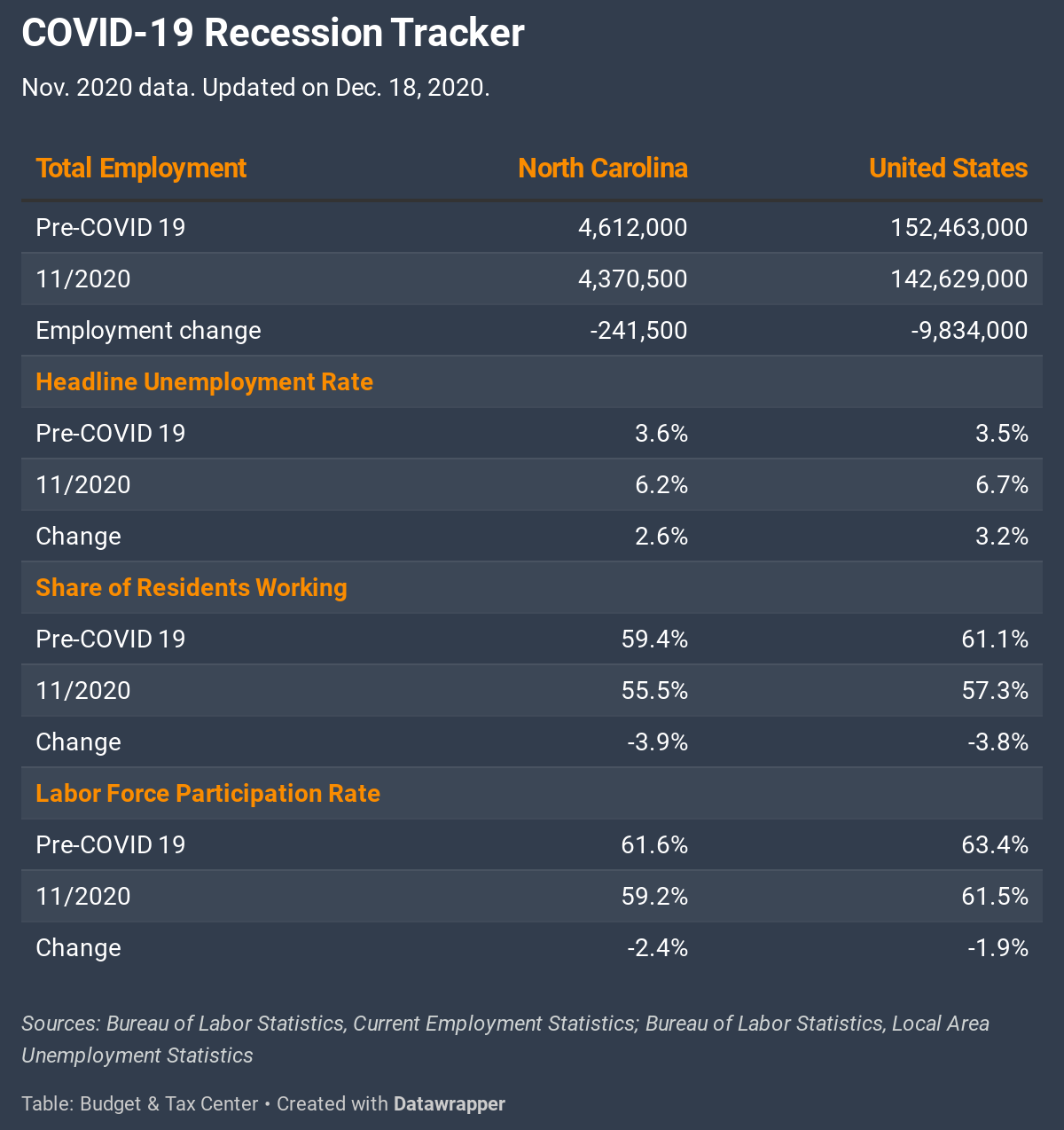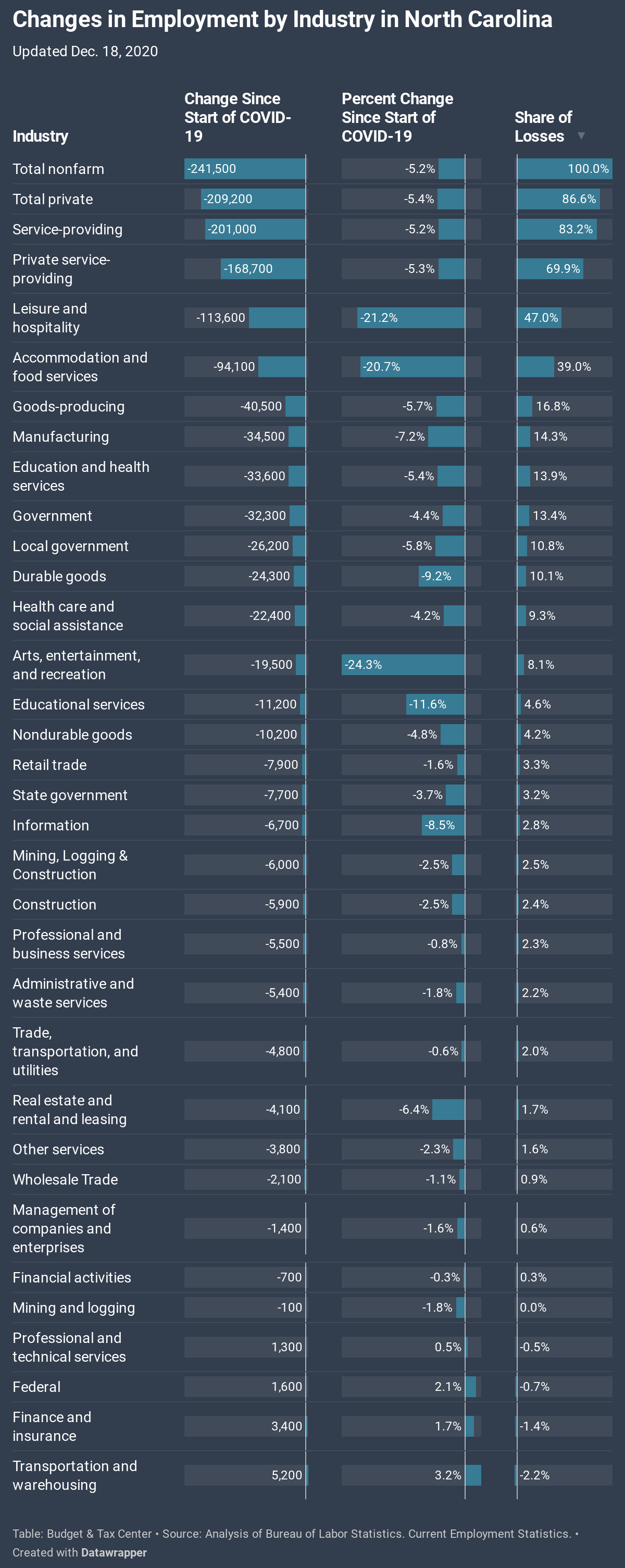With Senate still holding up aid, recession continues to hammer low-wage North Carolinians
RALEIGH (Dec. 18, 2020) — State labor market data released today show the COVID-19 recession continues to create the worst economic harm for people with the least economic cushion. Job losses are heavily concentrated in low-paying industries and more than 240,000 jobs have still not been recovered in North Carolina.
“The recovery has slowed to a crawl in the past few months, unemployment insurance is running out, and Senate leaders are still refusing to pass the kind of aggressive rescue package North Carolinians need,” said Patrick McHugh, Research Manager with the North Carolina Budget & Tax Center. “This is no time for politics. It’s time to do right by our friends and neighbors who are fighting to survive and put people first.”
Congress has spent the past several months debating the size and substance of another aid and stimulus package. While a package may be finalized in the coming days, it appears the proposals currently being debated will not address the full scope of the need that still exists.
“While the current proposed package falls short of fully addressing the challenges facing jobless workers, as a down payment that provides a $300 a week boost and may extend access to UI to more workers, it will provide a bridge to 2021 — when our leaders in Congress must get serious about sustaining the supports to people struggling in the COVID-19 crisis,” said Alexandra Sirota, Director of the Budget & Tax Center.
Click for charts with new labor market data
Economic challenges facing North Carolina include:
- Recovery has slowed dramatically in recent months: After recovering over 230,000 jobs in May and June, North Carolina has only added 50,500 jobs in the past two months. All told, nearly 40 percent of the jobs lost since the start of the recession have not been recovered and North Carolina still needs to add more than 240,000 jobs to get back to where we were before COVID-19.

- Historically low share of North Carolinians are working: The headline rate only captures people who are actively looking for work, so it won’t reveal the true extent of job and income losses for North Carolina families. Only 55.5 percent of North Carolinians were working in November, down from over 59 percent before the COVID-19 outbreak and far below levels that were common throughout most of the 1990s and 2000s.
- Recession is over for most highly paid North Carolinians while still devastating low-income workers: While not captured in the headline unemployment figures, job losses have fallen the hardest on North Carolinians with the least financial cushion. Data through mid October show high paying jobs with annual wages over $60,000 have fully recovered and only a modest decline in middle-wage jobs. While the recession is effectively over for many people in good-paying jobs, 1 in 5 North Carolinians who were paid under $27,000 before the recession are still out of work. Leisure and hospitality, an industry where many workers are paid extremely low wages, accounts for nearly half of the total employment losses during COVID-19.
- Job losses are heavily concentrated in some industries, particularly among worst paid workers: The COVID-19 recession has devastated workers in some industries while others have almost fully recovered. The largest persistent job losses since February have occurred in industries like Leisure and Hospitality (-113,600), Manufacturing (-34,500), Education and Health Services (-33,600), and Government (-32,300).
For charts showing the most recent labor data and COVID-19 job data, visit the Budget & Tax Center’s Labor Market page at www.ncjustice.org/labormarket.
For more context on the economic choices facing North Carolina, check out the Budget & Tax Center’s Prosperity Watch report.
FOR MORE INFORMATION, CONTACT Patrick McHugh, Budget & Tax Center Research Manager, at patrick.mchugh@ncjustice.org or 919-856-2183; or Mel Umbarger, Budget & Tax Center Senior Communications Specialist, at mel@ncjustice.org.
The nonpartisan Budget & Tax Center is a project of the NC Justice Center, which works to eliminate poverty in North Carolina by ensuring every household in the state has access to the resources, services and fair treatment it needs to achieve economic security.
 Justice Circle
Justice Circle 